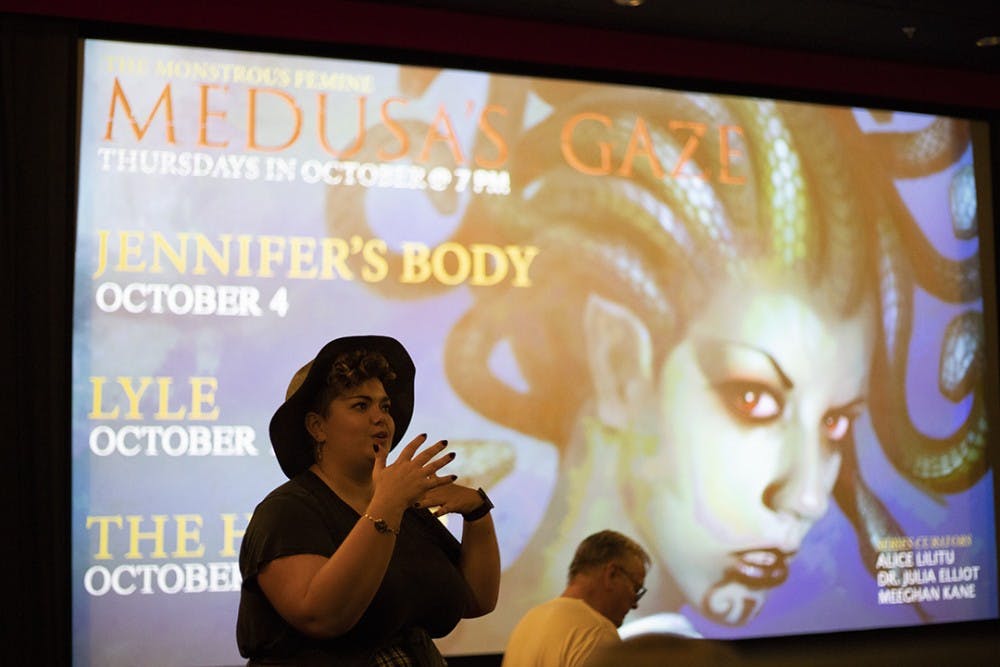“Hell is a teenage girl,” says flyers promoting Thursday night's showing of the 2009 black comedy “Jennifer’s Body.” While many think the film was misunderstood by both critics and audiences at the time of its release, a group of students from one USC class believes it’s time film lovers paid the campy, yet sharp-witted horror romp its dues.
“Monstrous Mothers and Femme Fatales: Gender and Monstrosity in Horror Film” is an honors proseminar that is currently being taught by associate professor of English and women's and gender studies Julia Elliott. During her course, students analyze horror films that center on female characters who exhibit the “monstrous feminine" trope. Whether it be an 80's cult classic or “the lesbian 'Rosemary’s Baby,'” the films on Elliott's syllabus challenge the tired tropes of horror by applying the female gaze.
"Since so many amazing horror films by women have emerged in the last five years, it was easy to build a syllabus around the evolution of the monstrous-feminine," Elliott said.
The course is actually an extension of a previous women's and gender studies course Elliott taught that compared and contrasted the horror films, "Rosemary's Baby" and "The Babadook." "Rosemary's Baby" was directed by controversial director Roman Polanski and follows the pregnancy of a woman who is unknowingly carrying Satan's child.
"The Babadook," on the other hand, is directed by Jennifer Kent and tells the story of a widow who must protect her son after a monster from his children's book physically manifests itself within their home. According to Elliott, both films offer "radically different visions of monstrous motherhood."
While horror is somewhat of an acquired taste as it isn't for the faint of heart, Elliott has been "obsessed with horror films ever since [she] was traumatized by The Exorcist at an inappropriately young age." As noted in her educational career, Elliott's fascination with the monstrous and the macabre has never wavered.
"As a grad student, I incorporated some feminist monster theory into my analyses of female monsters from Medieval and Renaissance literature, noting how each era’s monsters reveal both deeply rooted psychological hang-ups and historically specific anxieties about female sexuality," Elliott said. "As a genre-bending fiction writer, I dabble in body horror and science fiction, and I’m fascinated by other writers who do the same."
While this isn't the first of her courses to analyze films, it is the first to showcase them on the big screen at a theater. After making small talk at wedding reception with Meeghan Kane, both women came up with the idea to collaborate with the Nickelodeon Theater. The film series includes three films on Elliott's syllabus and is named after the infamous Greek mythological gorgon, Medusa.
“The "Medusa’s Gaze" series at the Nick, organized around a maiden / mother / crone theme, highlights the depiction of monstrous femininity at three key stages in life," Elliott said.
Each film screening is preceded by a group presentation from Elliott's students. “Jennifer’s Body” represents the maiden, the 2014 psychological horror “Lyle” represents the mother and the 80's cult classic directed by Tony Scott “The Hunger” represents the crone. While their goal was to only include female-directed films, Elliott knew that their series would be incomplete without a cult-classic.
Kane, a history professor at Benedict College and the editor-in-chief of the local feminist magazine “Unsweetened” is a co-curator of the film series. Since last year, both Kane and Elliott worked directly with former Nick director Alison Kozberg and former Nick programming manager Amada Torruella to make their idea a reality. However, after Kozberg and Torruella's departure from the theater, staff member Alice Lilitu came onboard to complete to final product.
"Honestly, the best part of this experience has been the planning," Kane said. "Talking horror movies with women like Julia Liz Elliott, Amada Torruella, Alice Lilitu, and Alison Kozburg is both enlightening and humbling.They are true experts of the genre."
“Jennifer’s Body” was the first film of the series to be screened. The teen comedy follows high school mean girl Jennifer Check as she goes on a bloody rampage after a Satanic ritual transforms her into a succubus with a craving for boys.
Fourth-year history student Victoria VanZomeren and her group shared their presentation on "Jennifer's Body" last Thursday night. In addition to a horror trivia game on the Kahoot app, she and her group members decorated the lobby of the Nick to resemble a high school prom, “but with a dark twist.” Leading up the film showing, the group posted flyers all around campus to promote the event.
Although "Jennifer's Body" is an off-beat comedy on its surface, through her work on her semester-long project, VanZomeren has discovered that there is more to the film than meets the eye.
“Jennifer’s Body focuses on the monstrosity society places on young women who embrace their own sexuality,” VanZomeren said in an email. “Young women are creepily sexualized by much of modern media but are demonized the second they act upon their sexuality. Jennifer’s Body takes this demonization literally.”
While she's always considered herself a horror buff, VanZomeren's work has led to view these films in an entirely different light.
“I used to enjoy horror movies for the thrill of it ... Now, however, it seems like I have a toolbox of theories with which to analyze horror movies,” VanZomeren said. “I can look at these ridiculous monsters and talk about the rejection of the patriarchy. It’s amazing.”
If anything, the group thinks October is arguably the ideal month to engage in spooky festivities. Although the series serves as a fun night at the movies, Elliott hopes that viewers look deeper into these films and leave with a stimulating conversation.
“I want people to consider how female horror directors revisit classic elements of the monstrous-feminine in intentionally feminist ways that have the power to reshape cultural attitudes about gender and sexuality," Elliot said.

